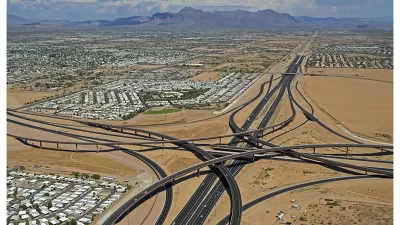In all likelihood the $478 billion transportation bill proposed by the Obama Administration earlier this week is dead on arrival. But can the federal government get a long-term bill together by the May 31 deadline?
"The Obama administration sent Congress a $478 billion bill Monday that would provide the federal share of transportation funding for the next six years, the first legislation out of the gate in a year that is likely to produce a competition among three bills," reports Ashley Halsey.
As the final statement of that paragraph implies, Halsey's coverage focuses on the prospect of the federal government getting its act together to pass a long-term transportation funding solution under the may 31 deadline. That prognosis is not good.
Halsey also explains that the Obama Administration's bill, as released on Monday is the least likely of the three versions to pass both houses, but to start the discussion, the bill proposes the following funding mechanism for the critical issue of the Highway Trust Fund: "The administration bill rolled out Monday would bolster the gas-tax reliant Highway Trust Fund by imposing a 14 percent tax on an estimated $2 billion that U.S. corporations have stashed offshore to avoid higher corporate tax rates." While either house is not expected to raise funding beyond the current $50 billion a year. The Obama Administration's proposal raises yearly spending by $25 billion.
Keith Lang also covers the Obama Administration's proposal, focusing especially on language in the bill that would "lift the ban on states placing tolls on existing highway lanes." Lang also provides insight into the arguments made in support and opposition of allowing toll lanes on federal highways.
In a separate article, Laing notes the outpouring of support for the Obama Administration's version of the bill from industry and advocacy sources like AAA.
FULL STORY: White House sends Congress $478 billion, 6-year transportation bill

Planetizen Federal Action Tracker
A weekly monitor of how Trump’s orders and actions are impacting planners and planning in America.

Maui's Vacation Rental Debate Turns Ugly
Verbal attacks, misinformation campaigns and fistfights plague a high-stakes debate to convert thousands of vacation rentals into long-term housing.

San Francisco Suspends Traffic Calming Amidst Record Deaths
Citing “a challenging fiscal landscape,” the city will cease the program on the heels of 42 traffic deaths, including 24 pedestrians.

Amtrak Rolls Out New Orleans to Alabama “Mardi Gras” Train
The new service will operate morning and evening departures between Mobile and New Orleans.

The Subversive Car-Free Guide to Trump's Great American Road Trip
Car-free ways to access Chicagoland’s best tourist attractions.

San Antonio and Austin are Fusing Into one Massive Megaregion
The region spanning the two central Texas cities is growing fast, posing challenges for local infrastructure and water supplies.
Urban Design for Planners 1: Software Tools
This six-course series explores essential urban design concepts using open source software and equips planners with the tools they need to participate fully in the urban design process.
Planning for Universal Design
Learn the tools for implementing Universal Design in planning regulations.
Heyer Gruel & Associates PA
JM Goldson LLC
Custer County Colorado
City of Camden Redevelopment Agency
City of Astoria
Transportation Research & Education Center (TREC) at Portland State University
Jefferson Parish Government
Camden Redevelopment Agency
City of Claremont





























